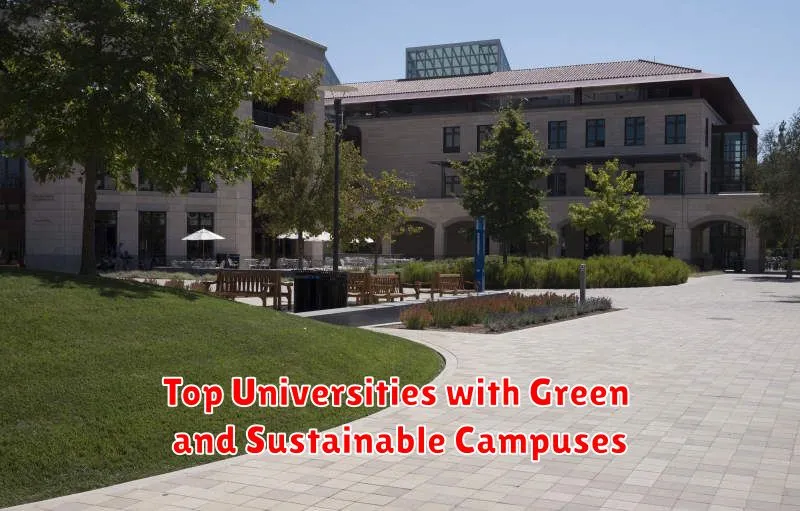In an era of increasing environmental consciousness, the importance of sustainability is paramount. Universities, as centers of learning and innovation, have a crucial role to play in modeling green practices and fostering sustainable development. This article explores the top universities worldwide that are leading the charge with their exceptional commitment to creating green and sustainable campuses. From innovative energy solutions and waste reduction programs to eco-friendly infrastructure and sustainable transportation initiatives, these institutions are demonstrating how higher education can contribute to a more environmentally responsible future.
Choosing a university is a significant decision, and for environmentally conscious students, the commitment of an institution to sustainability can be a key factor. This article provides a valuable resource for prospective students, researchers, and anyone interested in learning about the top universities with green and sustainable campuses. Discover the institutions that are setting new standards for green initiatives, promoting sustainable practices, and inspiring future generations to embrace environmental stewardship. Explore the cutting-edge approaches these top universities are employing to create vibrant, eco-friendly learning environments and contribute to a healthier planet.
What Is a Green Campus?
A green campus is an institution of higher education that has implemented sustainable practices throughout its operations, aiming to minimize its environmental impact and create a healthy and ecologically responsible environment.
This involves a wide range of initiatives encompassing areas such as:
- Energy efficiency: Utilizing renewable energy sources, reducing energy consumption, and implementing sustainable building designs.
- Water conservation: Implementing efficient irrigation systems, reducing water usage in buildings, and promoting water-wise landscaping.
- Waste management: Implementing comprehensive recycling programs, composting organic waste, and reducing waste generation.
- Sustainable transportation: Encouraging the use of public transportation, cycling, and walking, and promoting electric vehicles.
- Sustainable food systems: Sourcing locally produced and organic food, reducing food waste, and promoting sustainable dining practices.
By prioritizing these and other sustainability initiatives, green campuses contribute to a healthier planet while also providing educational opportunities for students and fostering a culture of environmental responsibility within the campus community.
Sustainability Certifications and Awards
Numerous certifications and awards highlight universities committed to environmental stewardship. These accolades recognize institutions that demonstrate exceptional sustainability performance across various aspects of campus operations.
LEED (Leadership in Energy and Environmental Design) certification is a prominent benchmark, signifying achievements in building design, construction, and operations. Campuses may earn LEED certification for individual buildings or achieve campus-wide recognition.
The STARS (Sustainability Tracking, Assessment & Rating System) program provides a comprehensive framework for measuring and reporting sustainability performance. STARS ratings recognize achievements in academics, engagement, operations, and planning.
Other notable certifications and awards include the AASHE (Association for the Advancement of Sustainability in Higher Education) STARS program, and awards presented by organizations such as the Sierra Club and the Princeton Review. These recognitions provide valuable third-party validation of a university’s commitment to sustainability.
University of British Columbia (UBC), Canada

The University of British Columbia (UBC) stands as a leader in sustainability within higher education. Located in Vancouver, British Columbia, the university has implemented numerous initiatives demonstrating its commitment to a greener future. UBC’s dedication to sustainability is evident in its holistic approach, addressing various aspects of campus operations and academic pursuits.
Key sustainability features of UBC include its innovative green building designs, incorporating LEED certifications and prioritizing energy efficiency. The campus also boasts a robust renewable energy program, utilizing sources like biogas and solar power. UBC actively promotes sustainable transportation options, encouraging cycling, walking, and public transit use.
Furthermore, the university’s strong focus on research and education in sustainability prepares future generations to address global environmental challenges. Through various academic programs and research centers, UBC contributes significantly to the advancement of sustainable practices and technologies.
UBC’s Climate Action Plan sets ambitious targets for reducing greenhouse gas emissions, aiming to achieve net-zero emissions by 2050. The university’s ongoing commitment to sustainability makes it a model institution for others to follow.
University of Nottingham, UK

The University of Nottingham demonstrates a strong commitment to sustainability through various initiatives across its UK campuses. Its Sustainable Nottingham plan focuses on key areas like carbon reduction, waste management, and biodiversity.
The University actively works towards reducing its carbon footprint. Efforts include investing in renewable energy sources and implementing energy-efficient technologies in buildings. The institution also promotes sustainable transportation options for staff and students.
Waste reduction is another priority. The University has implemented comprehensive recycling programs and aims to minimize waste sent to landfills. Furthermore, the University promotes biodiversity through the management of its green spaces and the creation of habitats for local wildlife.
The University of Nottingham’s commitment to sustainability has earned it recognition and awards, solidifying its place as a leader in creating a greener campus environment.
University of California, Davis

The University of California, Davis (UC Davis) is renowned for its commitment to sustainability. The campus serves as a living laboratory for environmental research and practices.
UC Davis holds a Platinum rating in the Sustainability Tracking, Assessment & Rating System (STARS), highlighting its comprehensive approach. Key initiatives include zero waste goals, renewable energy development, and sustainable transportation programs.
The campus features LEED-certified buildings, extensive bicycle infrastructure, and dedicated natural reserves used for research and education. UC Davis emphasizes sustainable agriculture and food systems, reflecting its agricultural heritage. Its commitment to creating a green and sustainable environment benefits both the campus and the wider community.
Lund University, Sweden

Lund University demonstrates a strong commitment to sustainability, integrating it into research, education, and campus operations. The university actively works towards minimizing its environmental footprint and promoting a green campus culture.
Key initiatives include a comprehensive environmental management system, focusing on areas like energy efficiency, waste reduction, and sustainable transportation. Lund University promotes sustainable food choices within its dining facilities and supports research projects dedicated to exploring innovative solutions for environmental challenges.
The university also emphasizes education and awareness, offering various programs and initiatives that engage students and staff in sustainable practices. This holistic approach makes Lund University a leading example of a higher education institution striving for a greener future.
Monash University, Australia

Monash University is a leader in sustainability, demonstrating a strong commitment to environmental responsibility across its operations and research. The university has implemented a comprehensive sustainability plan encompassing various initiatives.
A key focus area is reducing carbon emissions. Monash aims to achieve net-zero emissions by 2030 through a combination of renewable energy sources, energy efficiency improvements, and sustainable transport options.
The university also prioritizes water conservation. Strategies include rainwater harvesting, efficient irrigation systems, and promoting water-wise practices within the campus community.
Waste management is another crucial aspect of Monash’s sustainability program. The university actively promotes recycling and composting programs to minimize waste sent to landfills.
Furthermore, Monash University integrates sustainability into its curriculum and research activities. This fosters a culture of environmental awareness among students and faculty, contributing to future sustainable solutions.
Arizona State University, USA

Arizona State University (ASU) demonstrates a strong commitment to sustainability through various initiatives across its campuses. ASU emphasizes renewable energy, aiming to achieve carbon neutrality.
The university actively pursues waste reduction and recycling programs. Furthermore, ASU incorporates sustainable design principles into its buildings, prioritizing energy efficiency and water conservation.
ASU’s dedication to sustainability extends to its academic programs, offering a wide range of courses and research opportunities focused on environmental issues. This commitment to a green campus fosters a culture of sustainability amongst its students and faculty.
University of Exeter, UK

The University of Exeter has demonstrated a strong commitment to sustainability, earning recognition for its green initiatives. The institution has implemented various programs aimed at reducing its environmental impact and fostering a culture of sustainability among its staff and students.
Key areas of focus include carbon reduction, waste management, and sustainable food sourcing. The university actively invests in renewable energy sources and promotes energy efficiency across its campuses. Furthermore, it implements comprehensive recycling programs and strives to minimize waste generation.
The University of Exeter’s commitment extends to its curriculum, offering a range of programs related to environmental science and sustainability, equipping students with the knowledge and skills to address pressing environmental challenges.
University of Tokyo, Japan

The University of Tokyo (UTokyo) demonstrates a strong commitment to sustainability through various initiatives across its campuses. UTokyo’s approach focuses on integrating sustainability into education, research, and campus operations.
Key sustainability efforts at UTokyo include promoting energy conservation through efficient building design and renewable energy sources. The university actively pursues research and development in areas like renewable energy technologies and sustainable urban planning. UTokyo also emphasizes environmental education and awareness programs to engage its community in sustainable practices.
UTokyo’s commitment is reflected in its various sustainability certifications and its participation in global sustainability networks. The university’s ongoing efforts contribute to a greener campus and a more sustainable future.
Vrije Universiteit Amsterdam, Netherlands

Vrije Universiteit Amsterdam (VU Amsterdam) demonstrates a strong commitment to sustainability, evident in its various green initiatives across its campus. The university actively works towards reducing its ecological footprint and promoting a sustainable environment for learning and research.
VU Amsterdam focuses on energy efficiency, implementing measures to minimize energy consumption in its buildings and operations. The university also prioritizes waste reduction and recycling programs, aiming to divert waste from landfills and promote circularity.
Furthermore, VU Amsterdam promotes sustainable transportation options, encouraging the use of bicycles and public transport among its staff and students. The campus itself incorporates green spaces, fostering biodiversity and creating a pleasant environment.
Through these initiatives, VU Amsterdam strives to be a leader in sustainability within the higher education sector and contribute to a greener future.

